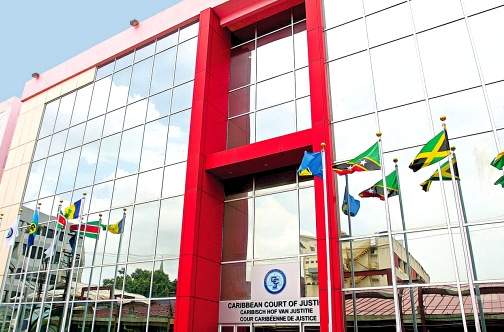The recent application asking Guyana’s final court, the Caribbean Court of Justice (CCJ) to reconsider its decision in a decades-long Essequibo land dispute is the first of its kind since the court was inaugurated 13 years ago.
This is according to the court’s President, Justice Adrian Saunders who explained that though such a recourse is available, it has never been utilized until now.
Saunders was asked by Stabroek News on Thursday shortly after speaking at a business luncheon whether many such applications were filed previously. In response, he disclosed that this is the first.
The case in question involves Kowsal Narine and his brother Deonarine Natram along with former owners of the land, Ashbourne Lipton Chan and Foster Gilford Chan and concerns 5.21 acres of land, which is located at Section ‘C,’ Golden Fleece, Essequibo.
In its decision which was delivered on May 10th, the court ruled that Narine had been in “sole and undisturbed possession of the land since 1st June 1991 and that any title, right or interest of Deonarine had been extinguished pursuant to the Act.” The ruling affirmed a High Court decision made by Justice Roxane George, who had ruled that Narine had been entitled to the land through prescriptive rights.
A post-judgment application was later filed asking in part for the matter to be retried by CCJ after it was discovered that Narine had acquired a transport for the disputed land prior to the hearing and determination of the case by the Court of Appeal but never made mention of this to that court or the CCJ.
Justice Saunders told Stabroek News that the court will now look at the documents submitted and is looking to rule on whether it will hear the application in the next couple of weeks.
He pointed out that such a case may lead to similar filings and the CCJ will now have to prepare itself for such matters.“We would have to find ways of dealing with…a flood”, he said while adding that one such measure to deal with additional applications is to increase the number of judges. He said that at the moment the court has seven judges but the Revised Treaty of Chaguaramas allows up to ten.
He reckoned that if Jamaica or Trinidad should accept the CCJ as their final appellate court, there will be “so many more appeals filed that we may need at least one more judge”. He stressed that the court has a responsibility to regulate its work in a way that allows it to deal with the workload that comes in.
Attorney at law Anil Nandlall, in his application to the court, asked for the decision to be set aside and/or amended and/or varied; an order granting a rehearing of the appeal or, alternatively, that leave be granted to permit further arguments by the parties, more particularly the applicant, and such further or other orders which may be necessary and appropriate to prevent a miscarriage of justice.
Listed among the grounds for the application is the assertion that Narine deliberately withheld material facts from the CCJ, the Court of Appeal and the Commissioner of Title, which could have resulted in different outcomes.
It is being argued that there are errors of law disclosed in the decision; that the matters aforesaid have caused a miscarriage of justice through no fault of Natram, who is the applicant/first named respondent and that the CCJ being the court of final resort “has an inherent power to correct any injustice or any miscarriage of justice caused by an earlier decision of this honourable court.”
It is stated, too, that this power and jurisdiction is necessary to ensure justice between litigants and public confidence in the administration of justice and that this “fit and proper” case presents the requisite exceptional circumstances for the court to invoke the aforesaid inherent power.
Natram stated in his affidavit that approximately one week after the court’s decision was delivered, he was informed by a staffer at the Deeds Registry in Essequibo, who read a publication in the Stabroek News about the matter, that Narine had already acquired transport for the land. He later found this to be true and was able to get a copy of the transport.










